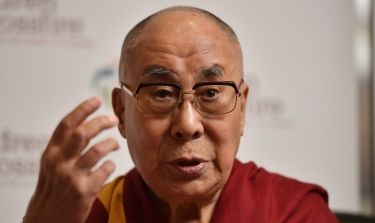Dalai Lama ‘unfairly labelled’ over tongue video: Tibet leader
Penpa Tsering says the Dalai Lama was called names that really hurt the ‘sentiment of all his followers’.

The head of Tibet’s government-in-exile has defended the Dalai Lama over a video of the Buddhist leader asking a boy to suck his tongue, saying the incident had demonstrated his innocent and affectionate side.
The Nobel peace laureate apologised after the footage from a public event, which also shows him apparently giving the boy a peck on the lips, went viral, leading to a wave of condemnation on social media that his actions amounted to abuse.
Keep reading
list of 3 itemsTibet dying a ‘slow death’ under Chinese rule, says exiled leader
Home away from home: The untold story of Canada’s ‘Little Tibet’
Penpa Tsering, the Sikyong – or political leader of the exiled Central Tibetan Administration – said on Thursday the Dalai Lama had been “unfairly labelled with all kinds of names that really hurt the sentiment of all his followers”.
The 87-year-old’s “innocent grandfatherly affectionate demeanour” shown in the footage had been misinterpreted, Tsering told reporters in New Delhi, adding a life of celibacy and spiritual practice had taken the Dalai Lama “beyond the sensorial pleasures”.
The video clip, filmed in February and circulated this month, has been viewed more than one million times on Twitter.
Tsering said investigations showed “pro-Chinese sources” were involved in making it go viral, adding “the political angle of this incident cannot be ignored”.
The Dalai Lama, who fled to India in 1959 after a failed uprising against Chinese rule in Tibet, is regarded by Beijing as a “dangerous separatist”.
The Dalai Lama has made the Himalayan town of Dharamshala his headquarters since fleeing from Tibet after a failed uprising against Chinese rule in 1959. India considers Tibet to be part of China, though it hosts Tibetan exiles.
The Noble Peace Prize winner has worked for decades to draw global support for linguistic and cultural autonomy in his remote, mountainous homeland.